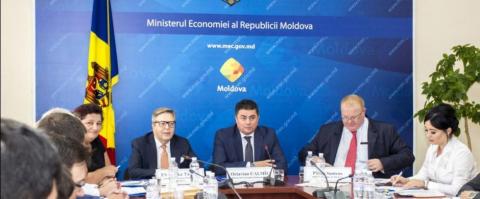
The EU4Business-supported project to help implement the Republic of Moldova’s Deep and Comprehensive Trade Agreement (DCFTA) with the EU has increased access to finance, generated jobs and helped align Moldovan standards with those of the EU, making products safer and improving trading opportunities. These were the conclusions of the event held on 23 August to mark the end of the DCFTA Sector Reform Contract project.
Major achievements
The project has had success both in improving the legislative environment and giving direct help to business and people.
Successes to align procedures and laws with the EU and make products safer include:
- Drafting and adoption of the law on metrology and the law on market surveillance and product safety;
- Adoption of 3 402 EU standards into national law
- Procurement of new equipment for testing laboratories, worth over €1.7 million;
- Procurement of the new express testing equipment and procedural materials for the National Food Safety Agency (ANSA) and the Consumer Protection Agency (CPA);
- Introduction of new risk-based management analysis control procedures in ANSA at border inspection points;
- Introduction of new risk-based management analysis control procedures in the CPA for Low Voltage devices, toys and non-automatic weighing instruments.
While the project was also help business more directly with:
- provision of 1 600 SME access to finance grants, which generated close to 2 000 jobs.
- opening of two new Business Incubators in Calarasi and Cahul, providing a variety of business support services to around 60 people;
- generation of 30 export contracts as a result of export missions organised in 2015-2016;
- help for 16 potential foreign investors.
- launch of Women in Business Programme specifically designed to help women entrepreneurs in the Republic of Moldova.
- organisation of more than 150 DCFTA Awareness events for around 8 000 people, over half of which were women.
“Within the lifespan of the DCFTA Sector Reform Contract, the DCFTA Technical Assistance Project has played a major role in allying the Moldovan quality infrastructure system and procedures to EU standards. This contributed to improving the safety of locally available products and services, as well as boosting the presence of local enterprises on both Moldovan and foreign markets and increasing the awareness of the Moldovan population on different aspects related to DCFTA”
Pirkka Tapiola, EU Ambassador to the Republic of Moldova
The €30 million programme has helped Moldova’s institutions and businesses adapt to make the most of the free trade area between the EU and the Republic of Moldova that was set up in 2014.
